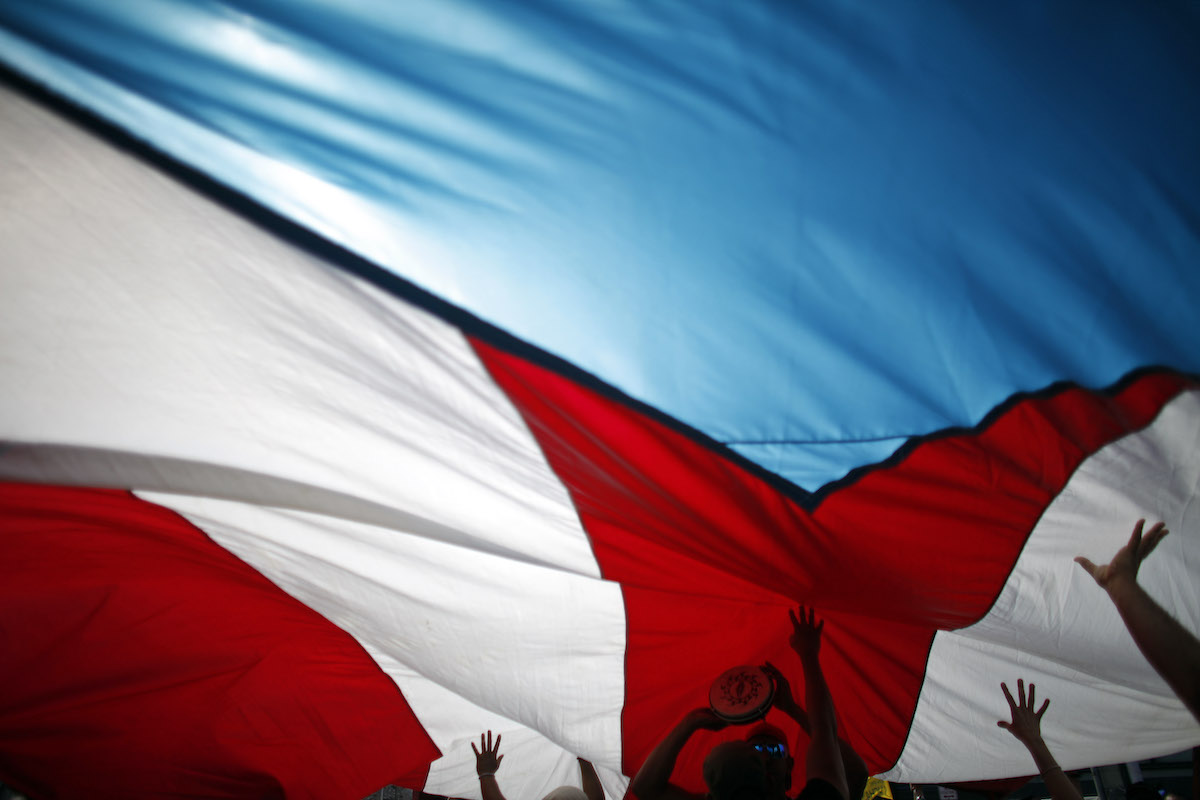

(AP Photo/Ricardo Arduengo, File)
While movement this week from the House Committee on Natural Resources is likely focusing on a consensus Puerto Rico Status Act for a hearing before the August recess that could get the draft bill past committee and onto the House floor, Illinois’ two Senators have added their name to a growing list of upper chamber co-sponsors of a current self-determination bill that contains no consensus provisions with the island-colony’s statehood proponents.
A Thursday joint press release said that U.S. Senate Majority Whip Dick Durbin (D-IL) and U.S. Senator Tammy Duckworth (D-IL) are co-sponsoring the Puerto Rico Self-Determination Act of 2021, initially sponsored by Sen. Bob Menendez (D-NJ) last year. Durbin and Duckworth became the bill’s 10th and 11th Senate co-sponsors, which also include former presidential candidates Sen. Bernie Sanders (I-VT), Sen. Elizabeth Warren (D-MA), Sen. Amy Klobuchar (D-MN) and Sen. Cory Booker (D-NJ). Sen. Roger Wicker (R-MS) and Sen. Richard Burr (R-NC) are the two Republican co-sponsors.
When Menendez introduced the bill to the Senate last year., a similar House bill was presented by Rep. Nydia Velázquez (D-NY) and Rep. Alexandria Ocasio-Cortez (D-NY)—two New York Democrats of Puerto Rican descent who are now public supporters of the Puerto Rico Status Act that the House Committee on Natural Resources is now exploring. Resident Commissioner Jenniffer González, the island-colony’s non-voting member of Congress and a Republican, is also actively involved in support of the Puerto Rico Status Act. Last year, González and Rep. Darren Soto (D-FL) presented a Puerto Rico Statehood Admission Act that was also presented by Sen. Martin Heinrich (D-NM) in the Senate. The statehood bill currently has five co-sponsors, all Democrats.
Right now, there is no Senate version of any Puerto Rico Status Act, which essentially takes elements of the self-determination and statehood bills, calling for a binding vote on Puerto Rico’s political status. The consensus bill calls for a binding vote that gives Puerto Ricans three options—statehood, independence or free association. Puerto Rico’s current colonial status —disguised under the “Commonwealth” status— is not an option.
The self-determination bill calls for a status convention where delegates would debate different status options and present the preferred option to Congress. That is what Durbin and Duckworth are supporting, noting in the release that “their support for this bill comes ahead of Chicago’s annual Puerto Rican Festival and the 43rd Puerto Rican People’s Day Parade.”
“More than three million Puerto Rican residents deserve a fair process to determine their own future,” Durbin said. “I am fortunate to represent many Puerto Ricans in Chicago who have voiced their support to use a democratic, inclusive process to determine Puerto Rico’s future. I thank Senator Menendez for his leadership on this bill.”
“Puerto Rico’s status is a critical matter of autonomy for so many Puerto Ricans—and I’m glad that Congress is elevating the people’s right to self-determination,” said Duckworth. “The Puerto Rican Self-Determination Act [sic] makes it clear that the citizens of Puerto Rico deserve an inclusive and transparent process to decide their political future, and I’m proud to join Senator Menendez and Senator Durbin on this legislation.”
The consensus bill has its controversies, but most observers who follow Purto Rican status politics have acknowledged how historic it is for finally bringing political opponents under one bill.
However, no bill is perfect, and questions still remain, particularly on issues of who exactly gets to vote in a binding plebiscite and whether legislative text should be translated into Spanish.
In addition, one Puerto Rico diaspora group that has been active in raising awareness on issues surrounding Puerto Rico expressed immediate support for Durbin and Duckworth.
“We applaud Senators Durbin and Duckworth for standing up for the only bill that would decolonize Puerto Rico in a truly democratic way, with the people impacted by US colonialism at the front and center,” said Power 4 Puerto Rico Director Erica Gonzalez. “As a veteran, Sen. Duckworth understands that fighting for democracy abroad but derailing fair self-determination at home is a contradiction, while Sen. Durbin, who has rallied for immigration reform and tackled the abuse of Big Pharma, knows that the decolonization of the Island must not exclude swaths of Puerto Ricans who don’t have millions of dollars to advocate in Washington every day.”
In 2020, the results of a non-binding gave statehood a 52%-48% victory. Before the 2020 non-binding plebiscite, there were two other plebiscites since 2012. In the non-binding plebiscite of 2012, Puerto Ricans rejected the island’s current Commonwealth status and chose statehood. In a 2017 non-binding plebiscite, 97% of voters chose statehood, although the total vote was the lowest vote for statehood since 1967. Both the 2012 and 2017 plebiscites were boycotted by non-statehood advocates, although the 2020 vote was not. All three non-binding plebiscites have been criticized as being political tools of the island’s pro-statehood party.
***
Julio Ricardo Varela is the Editorial Director of Futuro Media and founder of Latino Rebels.



[…] that could get the draft bill past committee and onto the House floor, Illinois’ two Senators have added their name to a growing list of upper chamber co-sponsors of a current self-determination bill that […]